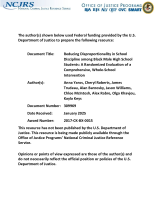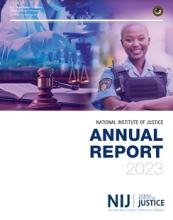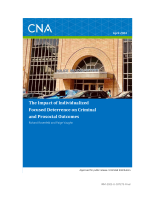Criminal justice research
Targeting the "Absence" in a Desistance Framework: Balancing Risk and Rehabilitation in Mandated Criminal Background Check Employment Decisions
Contemplative Practices and the Movement Toward a More Just Criminal Legal System
The Association Between Intimate Partner Encouragement of Alcohol Use and Alcohol Use Among Females Formerly Involved in the Juvenile Justice System
Documentation for SAS-Compatible LOGIT, TOBIT and MVPROBIT Procedures
Data Resources of the National Institute of Justice, 13th Edition
Improving the Effectiveness and Utilization of Neighborhood Watch Programs: Executive Summary
IMPACTING CRIMINAL JUSTICE THROUGH RESEARCH
Crime, Law Enforcement and Illegal Immigration: A Partial Bibliography
Beyond General Deterrence in White Collar Crime: Empirical Evidence and Theoretical Perspectives
New Orleans Offender Study: Phase 1, Volume 1: Description of Official Record Data and Coding Process
Randomized Field Experiments in Criminal Justice Agencies
Resources, Homophily, and Dependence - Agency Properties and Asymmetric Ties in Human Service Networks
Research on Sentencing - The Search for Reform - Summary Report
National Institute Host Program, Phase 4 - Final Report
Alternatives to Analysis of Covariance for Estimating Treatment Effects in Criminal Justice Evaluation - Comparative Results
Counselor Knows Best? Clinician Assessments of In-Prison Substance Abuse Treatment Participants
Reducing Disproportionality in School Discipline among Black Male High School Students: A Randomized Evaluation of a Comprehensive, Whole-School Intervention
Advancing Denver’s Handgun Intervention Program through Action Research
National Institute of Justice Fiscal Year 2023 Annual Report
Responding to Intimate Partner Violence Related Strangulation Integrating Policy, Practice, and Rese
This webinar examines the problem of Intimate Partner Violence Strangulation and an innovative response policy. The presentation will include an overview of the nature and extent of strangulation, its dangers, and adverse medical consequences followed by a review of a Strangulation Ordinance in Burleson, Texas that mandates extensive training for first responders and a city-wide response protocol for strangulation detection and investigation, documentation of strangulation signs and symptoms, medical assistance, and service referrals for strangulation survivors.
See the YouTube Terms of Service and Google Privacy Policy





